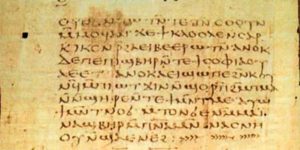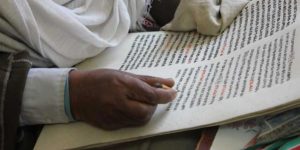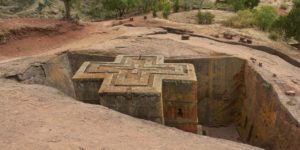Shepherds of Ancient Biblical Practices
Beta Israel and the Second Temple Period
Thousands of members of the Beta Israel community, also known as Ethiopian Jews, celebrated a unique holiday at the end of November. Traditionally on Sigd Holiday, the community fasts for a day during which they meet in the morning. Walking barefoot, together they make their way to the highest point on a mountain. There they worship and pray. The ritual is followed by the breaking of the fast, dancing, and general revelry.
Dr. Yossi Ziv believes this religious ritual and other customs of this population could come directly from the period of the Second Temple. Their traditions are almost identical to the type of Judaism portrayed in the writings of the Dead Sea Scrolls.
Customs Align
The differences between Ethiopian Judaism and the Judaism practiced by religious Jews today have led some to disparage the Ethiopian connection to the Jewish people. However, according to recent research presented by professor Dr. Ziv speaking at a seminar at the Kfar Etzion Field School, many Ethiopian customs align perfectly with descriptions of Jewish life and laws found in the Dead Sea Scrolls, which date from the Second Temple.
“They have been curating ancient customs that have disappeared from the world. They provide examples of how the leaders of the nation of Israel would have behaved during the time of the Second Temple.” The professor released his findings at a seminar right before the Jewish-Ethiopian holiday of Sigd.
The work by scholar, Frederick C. Gamst of the University of Massachusetts, aligns with the new information from Dr. Ziv. Gamst writes:
Beta Israel, innocent of Hebrew, the Talmud, and extra Old Testament Judaic lore and practices, share many behaviors, including Mosaic food taboos, with neighboring Ethiopian Orthodox Christians. These Christians possess a markedly Old Testament religion; have a hoary movement championing a Saturday Sabbath; call themselves Children of Israel; place the Ark of the Covenant at the center of their churches, wrote in Ge’ez (the precursor to Amharic) the religious texts from which Beta Israel derive all of their scriptures which are entirely in Ge’ez, have monarchs putatively descended from Solomon and Sheba; and label their emperors the Lion of Judah, which is their national icon.
Totally isolated from mainstream Judaism and the evolution of Jewish teachings through the Oral Law (Talmud), Ethiopian practice remained true to its purely Biblical roots, explained Dr. Ziv. His findings persuaded him that Ethiopian Jews are in fact an offshoot of the Biblical Israelites.
Dr. Ziv gave concrete examples of Ethiopian practices found in the Dead Sea Scrolls, providing evidence that even when Ethiopian customs seem to be in direct contradiction to mainstream Jewish ones, they are actually based on ancient sources. The discrepancies between the more “modern” Jewish law and the law of the Ethiopian Jewish elders, known as the Kessim, can be seen in different areas of Jewish law.
When our groups from Living Passages have traveled to Ethiopia, we have observed many of the ways of the Beta Israel that concur with his findings.
Diet and Day of Worship
Not only is there worship and music from the First Temple time period, but the Ethiopian Christians follow dietary rules that are similar to Jewish Kashrut. Specifically with regard to how an animal is slaughtered. Similarly, pork is prohibited, though unlike Rabbinical Kashrut, Ethiopian cuisine does mix dairy products with meat. This difference aligns Beta Israel to Jewish oral Torah. Furthermore, both the Sabbath (Saturday), and the Lord’s Day (Sunday) are observed as holy, although more emphasis, because of the Resurrection of Christ, is laid upon the Holy Sunday.
Ethiopian Orthodox worshipers remove their shoes when entering a church, in accordance with Exodus 3:5 where Moses, while viewing the burning bush, is commanded to remove his shoes while standing on holy ground.
In his presentation, Dr. Ziv brought attention to Beta Israel’s incredibly strict observance of the Sabbath or Shabbat. Unlike mainstream Judaism, which abides by a Talmud teaching that violating Shabbat is permitted in order to save a life, “For the Ethiopian Jews, the sanctity of Shabbat must be preserved, even at the cost of human life,” said Dr. Ziv, adding that similar stringencies were found in the Dead Sea Scrolls.
Another Second Temple-era custom practiced by Ethiopians includes not lighting Shabbat candles in observance of an ancient tradition which prohibits the use of a fire on the holy day, even if it was lit before Shabbat started.
Music and Festivals
An Orthodox church is considered consecrated when a local bishop issues the congregation a tabot, a replica of the tablets that were in the original Ark of the Covenant of Moses. The tabot is at least six inches square and made from alabaster, marble, or acacia wood. It is kept covered by expensive cloth or in ornate coverings or boxes to hide it from public view.
In an elaborate procession, the tabot is carried around the outside of the church amid joyful song and dance that is replicated from King David’s time. The participants hold silk umbrellas, which are symbols of heaven, swinging incense burners, beating drums and clapping cymbal-like instruments called sistras.
Priests recall the ancient Israelites described in the Bible. In 1 Chronicles 15:16 David told the leaders of the Levites to appoint their fellow Levites as musicians to make a joyful sound with musical instruments: lyres, harps and cymbals. It really is spectacular.
Gender Differences
In Beta Israel, women are prohibited from entering the church at specific times; they are also expected to cover their hair with a large scarf or sash while in church. But, contrary to the teaching of most other Christian denominations, it is not from instructions from the Old Testament that this is taken. Rather in the New Testament as in 1 Corinthians 11. As with Orthodox synagogues, men and women are seated separately in the Ethiopian church, with men on the left and women on the right when facing the altar.
Ethiopian women also follow very strict “purity” laws relating to menstruation and childbirth, physically separating themselves from the community for prescribed amounts of time until they are permitted to purify themselves and return. The practice is described in the Temple scroll of the Dead Sea Scrolls, according to Dr. Ziv.
This ritual purity is another reason why ritual circumcision is not carried out in Ethiopian Jewish synagogues. Therefore, the circumcisions are carried out next to the tent of the menstruating women, and often done by the women. It is only after the first 40 days after a boy is born that an Ethiopian mother can return to the village. If a girl is born, then the mother must wait 80 days. The baby naming then occurs in the village.
“They were a part of us, but were then cut off”
The differences between the rituals and customs of mainstream Judaism and Ethiopian Judaism undermined the authority of the traditional Ethiopian Jewish leaders after they made aliyah to Israel, and even undermined the Ethiopians’ claims that they are indeed Jews.
However, Ziv says that the customs and traditions of the Ethiopian Jews and their strong resemblance to Jewish traditions during the Second Temple Period only serve to strengthen their connection to Judaism as a whole.
“I’m convinced that this community was a part of the nation of Israel during ancient times, but they were cut off. We don’t know when or why, but it occurred before the Pharisic tradition became the mainstream Jewish tradition,” Dr. Ziv said. “The Jews of Ethiopia lived in exile and in complete isolation from the rest of the nation of Israel. However, they continued to keep the traditions of our forefathers up until this very day.”
His research revealed that not only are the Ethiopians Jews, they are actually the shepherds of ancient Biblical practices lost by mainstream Judaism.
Ethiopia Tours
Our Ethiopia tours offer you two unforgettable weeks to explore the Biblical history and archaeology of this Judaic-Christian country. You will gain valuable insight about Ethiopia’s Judaic history from an archaeological and church practice perspective. Experience first-hand the rich culture of Ethiopia as you visit Christian sites including the suggested home of the Ark of the Covenant, Yeha Temple, and many hand-cut rock churches. Additionally, your jaw will surely drop as you witness breath-taking scenery like Lake Tana, Tana Kirkos & Daga Islands, the Grand Canyon of Africa, and Rift Valley’s filled with exotic wildlife. Start off with an ancient celebration that’s been practiced since the time of King David and finish in Lalibela, home of the World Heritage list of archaeological finds. Our Ethiopia tours provide you with once in a lifetime opportunities.
Living Passages partners with Christian teachers across the United States to create, organize and execute top-quality Bible tours and Christian cruises for those interested in group travel. Teachers can invite members of their congregation to join them on a life-changing exploration of the Bible lands, as we take care of every travel detail. Living Passages can match Christian tour groups who would like to travel to the Bible Lands with a qualified teacher. If you would like additional information regarding our Ethiopia tours, call today 888-771-8717.



